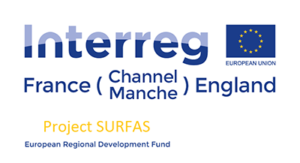SURFAS – Flexible Smart Surfaces for Augmented Indoor Communications
SURFAS is investigating how the energy in radio frequency (RF) radiation can be harvested efficiently and used to power electronic devices as an alternative to battery power and how attenuation can be minimised and propagation of wi-fi signals can be improved in buildings.
Project duration: February 2017 to May 2021
Project funding: Total budget: € 1.859 Million, ERDF amount: € 1.283 Million
Project Objective
The objective is to design a zero-power consuming electronic surface able to optimally focus ambient electromagnetic (EM) waves on the appropriate receiver in order to enable both self-powered CDs and improve their performances (sensitivity, range, rate). Such a system is new and missing in the market. It is expected to decrease the energy bill of the FCE zone by more than 5.9GWh a year, while saving 14.9 million € by just considering (but not limited to) both applications over Wi-Fi boosters and smoke alarms.
For these targeted applications two prototypes will be designed, fabricated, experimentally tested, validated over two demonstrators, and transferred to interested SMEs (more than 217 in the FCE zone) developing various kinds of CDs:
- The first prototype will increase the feeding power (lifetime) harvested from ambient waves over ISM/GSM/3G/Wi-Fi bands to enable EM-based self-powered devices such as smoke alarms, detectors, sensors, etc.
- The second prototype will increase the range of Wi-Fi signals without consuming additional power unlike common Wi-Fi-boosters.
Watch the video to find out more about the project
University of Kent Contribution and Team
Team members:
John Batchelor, Benito Sanz Izquierdo, Paul Young
Partners
ESIGELEC (Lead partner)

